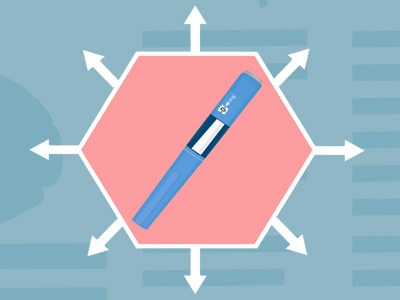Diabetes Centers
Enhancing and extending the effectiveness of diabetes research by encouraging collaboration among investigators from relevant disciplines.
NIDDK Program Staff
- Shavon Artis Dickerson, Dr.P.H., M.P.H. Clinical Management and Prevention of Type 2 Diabetes in Adults; Implementation Science; Centers for Diabetes Translation Research (P30) Program
- J. Rafael Gorospe, M.D., Ph.D. Clinical Studies and Interventions for T2D in Adults; Diabetic Peripheral Neuropathy; R25 Postbaccalaureate Research Education Program
- Pamela L. Thornton, Ph.D. Clinical Management and Prevention of Diabetes Mellitus, Implementation Science, Community Engagement Science
On this page:
- Funding for Diabetes Centers
- Resources and Services Available from Diabetes Centers
- Related Links
- Research Resources
- Additional Research Programs
- Meetings & Workshops
Funding for Diabetes Centers
NIDDK’s Diabetes Centers program supports extramural research institutions that have established an existing base of high-quality, diabetes-related research. The program supports and enhances interdisciplinary research in diabetes but does not directly fund major research projects; rather, it provides core resources to enhance the efficiency, productivity, and interdisciplinary cooperation of Center investigators conducting research in diabetes and related areas of endocrinology and metabolism.
NIDDK funds Diabetes Centers via P30. Please see the Diabetes Research Centers (DRC) application resources or the Centers for Diabetes Translation Research (CDTR) application resources for tables and additional documentation required in all Diabetes Centers applications.
Centers are funded on the following review schedule:
- CDTR: announcements are published once every 5 years
- DRC: are published three times every 5 years
Resources and Services Available from Diabetes Centers
NIDDK Diabetes Centers generate investigative resources that are available to the broader research community. Centers also provide short-term enrichment activities, as well as pilot and feasibility programs that fund small research grants designed to generate preliminary data for larger grant applications.
For more information about each Diabetes Center’s aims, shared resources, pilot and feasibility programs, enrichment programs, and activities, please visit their websites:
Diabetes Research Centers (DRCs)
The DRCs promote new discoveries and enhance scientific progress through support of cutting-edge basic and clinical research related to the etiology and complications of diabetes, with the goal of rapidly translating research findings into novel strategies for the prevention, treatment and cure of diabetes and related conditions. DRCs are intended to improve the quality and multidisciplinary nature of research on diabetes and related endocrinology and metabolism research by providing shared access to specialized technical resources and expertise and by creating an environment that supports important and innovative research. DRCs are expected to raise awareness and interest in fundamental and clinical diabetes research at their institutions, as well as locally, regionally, and nationally.
Albert Einstein-Mount Sinai Diabetes Center- Research Aims: Investigations primarily target the minority and other served under populations prevalent among the residents of the Bronx and Manhattan, adjacent Westchester county, and other boroughs comprising New York City. The primary research efforts encompass both type 1 (T1DM) and type 2 (T2DM) diabetes and related metabolic defects.
- Activities & Services
- Cores
- Animal Physiology Core
- Immuno-Technology
- The Human Islet & Adenovirus
- Stable Isotope & Metabolomics
- Translational Research
- Pilot & Feasibility Program
- Supports
- New investigators with interests in diabetes or related metabolic and endocrine disorders, including junior investigators shifting from mentor-based research to an independent career. Meritorious applications from new investigators receive priority for funding.
- Established faculty in other areas who wish to apply their expertise to diabetes research.
- Diabetes Center members who wish to explore a new area of research that constitutes a substantive departure from their on-going work.
- Supports
- Cores
- Research Aims: A consortium of laboratory-based and clinical investigators whose efforts are directed toward addressing many of the major research questions bearing on the etiology, pathogenesis, treatment and cure of type 1 and type 2 diabetes, and their associated microvascular and atherosclerotic complications.
- Activities & Services
- Cores
- Cell Biology and Morphology Core
- Metabolic Physiology Core
- Pancreatic Islet Core
- Transgenic Core
- Pilot & Feasibility Program
- Cores
- Research Aims: The DRC provides a central support structure to foster collaboration among investigators working in the areas of diabetes, immunology, transplantation, obesity and arteriosclerosis/lipid research and supports their activities by providing shared core resources, funding for pilot/feasibility studies and a common intellectual environment.
- Activities & Services
- Cores
- Translational Biomarker Analytical Core
- Cytometry and Cell Sorting Core
- Advanced Tissue Pathology and Imaging Core
- Mouse Metabolic Function and Phenotyping Core
- Pilot & Feasibility Program
- Cores
- Research Aims: The mission of the new, integrated Indiana Diabetes Research Center (IDRC) is to foster knowledge, support training, and promote basic and translational research in diabetes and related metabolic disorders, and their complications.
- Activities & Services
- Cores
- Islet and Physiology Core
- Microscopy Core
- Swine Core
- Translation Core
- Pilot & Feasibility Program
- Cores
Joslin Diabetes Center - Harvard Medical School
- Research Aims: The mission of the Joslin Diabetes Center has been to care for people with diabetes, and conduct research to provide new knowledge about diabetes and its complications that will lead to new treatments, prevention and/or cure of these disorders.
- Activities & Services
- Cores
- Animal Physiology Core
- Flow Cytometry Core
- Molecular Phenotyping and Genotyping Core
- Clinical Translational Core
- Genome Editing Core
- Pilot & Feasibility Program
- Enhance research into the pathogenesis, treatments and potential cures for all types of diabetes and their complications more generally.
- Cores
North Carolina Diabetes Research Center
- Research Aims: The North Carolina Diabetes Research Center supports an interactive diabetes research community across four premiere research institutions in North Carolina: Duke University (Duke) The University of North Carolina at Chapel Hill (UNC), Wake Forest School of Medicine (WF), and North Carolina A&T (NC A&T).
- Activities & Services
- Cores
- Genomics and Proteomics
- Metabolomics
- Pilot & Feasibility Program
- The North Carolina Diabetes Research Center Pilot & Feasibility Program will encourage use of regional Cores, bring to the field new investigators and young scientists, and draw those not previously working in the field.
- Cores
- Research Aims: The mission of the Stanford Diabetes Research Center is to support basic and clinical research to discover, apply and translate science about diabetes and it complications, to improve health and wellness.
- Activities & Services
- Cores
- Diabetes Immune Monitoring Core
- Clinical and Translational Core
- Islet Research Core
- Diabetes Genomics and Analysis Core
- Pilot & Feasibility Program
- Cores
- Research Aims: The center focuses on developing new methods to treat, prevent, and ultimately cure diabetes and its complications. The DRC supports the areas of animal physiology, human biology and intervention and translational research.
- Activities & Services
- Cores
- Animal Physiology Core (APC)
- Human Physiology Core (HPC)
- Interventions and Translation Core (ITC)
- Pilot & Feasibility Program
- The P&F program will foster new research programs in diabetes and support a broad base of basic, clinical, translational, and prevention and control projects.
- Cores
- Research Aims: The center fosters research in the prevention and treatment of diabetes and endocrine diseases and their complications and ultimately to improves the lives of endocrine patients.
- Activities & Services
- Cores
- Transgenic and Knockout Mouse
- Metabolic and Molecular Physiology
- Transcriptional Genomics
- Epigenetic and Genomics
- Human Genetics
- Pilot & Feasibility Program
- The DRC P&F mechanism will fund innovative new projects that will explore the feasibility of novel testable concepts and enhance the endocrine/diabetes research scope within the institutions.
- Cores
- Research Aims: The University of Chicago Diabetes Research and Training Center promotes multidisciplinary research in diabetes.
- Activities & Services
- Cores
- Cell Biology Core
- Genetics and Genomics Core
- Physiology Core
- Pilot & Feasibility Program
- Supports new investigators in diabetes research as well as established investigators in other fields to conduct novel research related to diabetes.
- Cores
- Research Aims:
- The University of Colorado Denver (UC Denver) is world renowned for basic, translational, and clinical diabetes research and treatment of both Type 1 and Type 2 diabetes (T1D and T2D), and their related complications.
- Activities & Services
- Cores
- Clinical Resource
- Tissue Procurement and Processing
- Cell and Tissue Analysis
- Disease Modeling
- Pilot & Feasibility Program
- The UC Denver Pilot & Feasibility Program will recruit young faculty into diabetes and diabetes-related research and encourage established investigators from other fields to enter the diabetes field.
- Cores
- Research Aims: The goal of the MDRC is to establish, promote, and enhance multidisciplinary and collaborative basic biomedical and clinical research among member investigators studying diabetes, its complications, and related endocrine and metabolic disorders.
- Activities & Services
- Cores
- Animal Studies Core
- Clinical Core
- Molecular Genetics Core
- Microscopy, Imaging, and Cellular Physiology Core
- Pilot & Feasibility Program
- Proposals must focus on type 2 translational research in diabetes: the translation of research advances into widespread clinical or community practice. The research may focus on the identification of barriers to widespread adoption of new science and the testing of interventions to overcome those barriers.
- Cores
- Research Aims: Supports research in diabetes and endocrinology via Scientific Cores, a Pilot and Feasibility Grant Program, and a series of seminars, retreats and other activities that facilitate communication and collaboration of DRC investigators while keeping them abreast of the latest discoveries in diabetes and endocrinology.
- Activities & Services
- Cores
- Functional Genomics Core
- Metabolomics Core
- Islet Cell Biology Core
- Mouse Phenotyping, Physiology and Metabolism Core
- Radioimmunoassy/Biomarker Core
- Transgenic and Chimeric Mouse Core
- Viral Vector Core
- Pilot & Feasibility Program
- The P&F program is particularly directed at new investigators and established investigators new to diabetes research. Established diabetes investigators pursuing high impact/high risk projects or projects that are a significant departure from their usual work are also eligible for support under the DRC P&F program. Applications are welcome from basic, clinical and translational investigators.
- Cores
- Research Aims: Facilitating and enhancing diabetes research to find a cure to diabetes.
- Activities & Services
- Cores
- Cell Function Analysis Core
- Cellular and Molecular Imaging Core
- Quantitative and Functional Proteomics Core
- Vector and Transgenic Mouse Core
- Pilot & Feasibility Program
- Intended to develop new research in the area of diabetes and its complications at the University of Washington.
- Cores
- Research Aims: Our long-term goal is the development of new preventive strategies and therapies aimed at improving the lives of Americans with diabetes and those at risk for diabetes and related metabolic disorders.
- Activities & Services
- Cores
- Diabetes Models Phenotyping Core
- Transgenic & ES Cell Core
- Translational Diagnostics Core
- Cell and Tissue Imaging Core
- Metabolic Tissue Function Core
- Metabolomics Core
- Pilot & Feasibility Program
- Cores
Vanderbilt Diabetes Research and Training Center
- Research Aims: The Vanderbilt Diabetes Research and Training Center (DRTC) is a NIH-sponsored Diabetes Center that facilitates the discovery, application, and translation of scientific knowledge to improve the lives of people with diabetes. Our investigators conduct basic, clinical, and translational research on the etiology, prevention, treatment, and complications of diabetes and obesity. The DRTC supports core facilities that enhance diabetes-related research and organizes an Enrichment Program of seminars and small groups that create a dynamic and inclusive environment for the training of the next generation of scientists. We invite you to collaborate or interact with us as we work to reduce the burden of diabetes.
- Activities & Services
- Cores
- Hormone Assay & Analytical Services Core
- Animal Metabolic Physiology Core
- Human Metabolic Physiology and Genomics Core
- Islet and Pancreas Analysis
- Pilot & Feasibility Program
- Cores
- Research Aims: The scope of the research activities of the membership is very broad, ranging from basic molecular biology to whole body clinical physiology in patients with diabetes.
- Activities & Services
- Cores
- Cell Biology Core
- Clinical Metabolism Core
- Diabetes Translational Core
- Physiology Core
- Molecular Genetics Core
- Pilot & Feasibility Program
- Priority will be given to new collaborative investigations.
- Cores
Centers for Diabetes Translation Research (CDTRs)
The CDTR mission is to improve translation of research related to diabetes prevention, treatment, by supporting research across the translational research spectrum (e.g., moving from efficacy to testing effectiveness in real world practice and communities and dissemination and implementation science). CDTRs are intended to enhance the efficiency, productivity, and multidisciplinary and multisectoral nature of diabetes translation research through shared access to specialized technical expertise and resources. CDTRs' expertise includes intervention adaptation and refinement, development of measures, techniques, processes, methods, and practices related to diabetes translation research. These innovative Centers along with their diverse partnership models provide the infrastructure needed to advance translational research in health disparities by providing core services and consultation at their local institutions, as well as resources regionally and nationally.
Related Links
-
-
-
-
-
-
View related clinical trials from ClinicalTrials.gov.
-
Study sections conduct initial peer review of applications in a designated scientific area. Visit the NIH’s Center for Scientific Review website to search for study sections.
Research Resources
NIDDK makes publicly supported resources, data sets, and studies available to researchers to accelerate the rate and lower the cost of new discoveries.
- Ancillary Studies to Major Ongoing Clinical Studies to extend our knowledge of the diseases being studied by the parent study investigators under a defined protocol or to study diseases and conditions not within the original scope of the parent study but within the mission of the NIDDK.
- NIDDK Central Repository for access to clinical resources including data and biospecimens from NIDDK-funded studies.
- NIDDK Information Network (dkNET) for simultaneous search of digital resources, including multiple datasets and biomedical resources relevant to the mission of the NIDDK.
Additional Research Programs
Research Training

NIDDK supports the training and career development of medical and graduate students, postdoctoral fellows, and physician scientists through institutional and individual grants.
Learn about NIDDK Research Training ProgramsSmall Business
Small Business Programs
NIDDK participates in the Small Business Innovation Research (SBIR) and Small Business Technology Transfer (STTR) programs. These programs support innovative research conducted by small businesses that has the potential for commercialization.
Learn about NIDDK Small Business ProgramsHuman Subjects Research
Human Subjects Research
NIDDK provides funding for pivotal clinical research, from preliminary clinical feasibility to large multi-center studies.
Learn about Human Subjects ResearchTranslational Research

NIDDK provides funding opportunities and resources to encourage translation of basic discoveries into novel therapeutics.
Learn about NIDDK Translational Research Opportunities-
NIH Common Fund
Learn about current projects and view funding opportunities sponsored by the NIH Common Fund.
-
Planning to Apply? Register Early
Registration is required at eRA Commons and grants.gov and can take 4 weeks.





